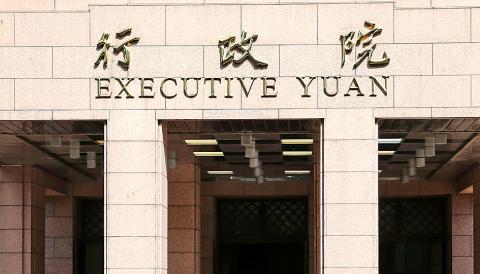The Executive Yuan has drafted an amendment to extend the period during which retired generals would be prohibited from traveling to China in an apparent response to two retired generals praising Chinese President Xi Jinping (習近平) at a political event in China last year.
The Executive Yuan on Thursday said it has drafted an amendment to the Act Governing Relations Between the People of the Taiwan Area and the Mainland Area (台灣地區與大陸地區人民關係條例) to extend the period during which former generals, mayors, science officials and intelligence officers must obtain Ministry of the Interior approval before they can travel to China to 15 years from three years.
The proposed amendment aims to prevent retired government and military officials from attending events in China that could unduly assert Chinese sovereignty over Taiwan, the Executive Yuan said.

Photo: CNA
The Chinese Communist Party’s (CCP) official People’s Daily on Jan. 29 reported that two retired Taiwanese generals, Huang Shing-chiang (黃幸強) and Chen Ting-chung (陳廷寵) in December last year attended the Cross-Strait Generals Forum in Xiamen in China’s Fujian Province.
The report was written by former Chinese-language People’s Liberation Army Daily president Huang Guozhu (黃國柱) and was titled: “Look over here, Taiwanese generals: Commemorating the 40th anniversary of the Message to Compatriots in Taiwan.”
At the event, Taiwanese generals discussed “reform and liberalization to jointly pursue development” with their Chinese counterparts, sang the Chinese national anthem and joined others in issuing an “initiative for peaceful unification,” the report said.
The generals also praised the “five points” that Xi mentioned in an address on Jan. 2, it said.
The paper quoted them as saying that China’s transformation to a more liberal economy has brought “tremendous benefits” to Chinese and Taiwanese, and that they endorsed the so-called “1992 consensus” and Beijing’s “one China” principle.
Huang was quoted as saying that “the hope of cross-strait unification must not evaporate. This is our shared goal as Chinese and members of the Zhonghua minzu [Chinese ethnic group, 中華民族].”
“When the development of Chinese culture reaches its climax, our nation shall be at its most powerful. Turning one’s back on Chinese culture would be forcing one’s self into oblivion,” Chen said, according to the report.
When reached for comment, Democratic Progressive Party Legislator Tsai Shih-ying (蔡適應) on Saturday said that soldiers have a duty to protect the nation, so if they ingratiate themselves with China, it would defeat the purpose of having a military.
Retired generals who ingratiate themselves with China do not deserve a pension, he added.
The “1992 consensus,” a term former Mainland Affairs Council chairman Su Chi (蘇起) in 2006 admitted to making up in 2000, refers to a tacit understanding between the Chinese Nationalist Party (KMT) and the CCP that both sides of the Taiwan Strait acknowledge there is “one China,” with each side having its own interpretation of what “China” means.

US President Donald Trump yesterday announced sweeping "reciprocal tariffs" on US trading partners, including a 32 percent tax on goods from Taiwan that is set to take effect on Wednesday. At a Rose Garden event, Trump declared a 10 percent baseline tax on imports from all countries, with the White House saying it would take effect on Saturday. Countries with larger trade surpluses with the US would face higher duties beginning on Wednesday, including Taiwan (32 percent), China (34 percent), Japan (24 percent), South Korea (25 percent), Vietnam (46 percent) and Thailand (36 percent). Canada and Mexico, the two largest US trading

AIR SUPPORT: The Ministry of National Defense thanked the US for the delivery, adding that it was an indicator of the White House’s commitment to the Taiwan Relations Act Deputy Minister of National Defense Po Horng-huei (柏鴻輝) and Representative to the US Alexander Yui on Friday attended a delivery ceremony for the first of Taiwan’s long-awaited 66 F-16C/D Block 70 jets at a Lockheed Martin Corp factory in Greenville, South Carolina. “We are so proud to be the global home of the F-16 and to support Taiwan’s air defense capabilities,” US Representative William Timmons wrote on X, alongside a photograph of Taiwanese and US officials at the event. The F-16C/D Block 70 jets Taiwan ordered have the same capabilities as aircraft that had been upgraded to F-16Vs. The batch of Lockheed Martin

GRIDLOCK: The National Fire Agency’s Special Search and Rescue team is on standby to travel to the countries to help out with the rescue effort A powerful earthquake rocked Myanmar and neighboring Thailand yesterday, killing at least three people in Bangkok and burying dozens when a high-rise building under construction collapsed. Footage shared on social media from Myanmar’s second-largest city showed widespread destruction, raising fears that many were trapped under the rubble or killed. The magnitude 7.7 earthquake, with an epicenter near Mandalay in Myanmar, struck at midday and was followed by a strong magnitude 6.4 aftershock. The extent of death, injury and destruction — especially in Myanmar, which is embroiled in a civil war and where information is tightly controlled at the best of times —

China's military today said it began joint army, navy and rocket force exercises around Taiwan to "serve as a stern warning and powerful deterrent against Taiwanese independence," calling President William Lai (賴清德) a "parasite." The exercises come after Lai called Beijing a "foreign hostile force" last month. More than 10 Chinese military ships approached close to Taiwan's 24 nautical mile (44.4km) contiguous zone this morning and Taiwan sent its own warships to respond, two senior Taiwanese officials said. Taiwan has not yet detected any live fire by the Chinese military so far, one of the officials said. The drills took place after US Secretary